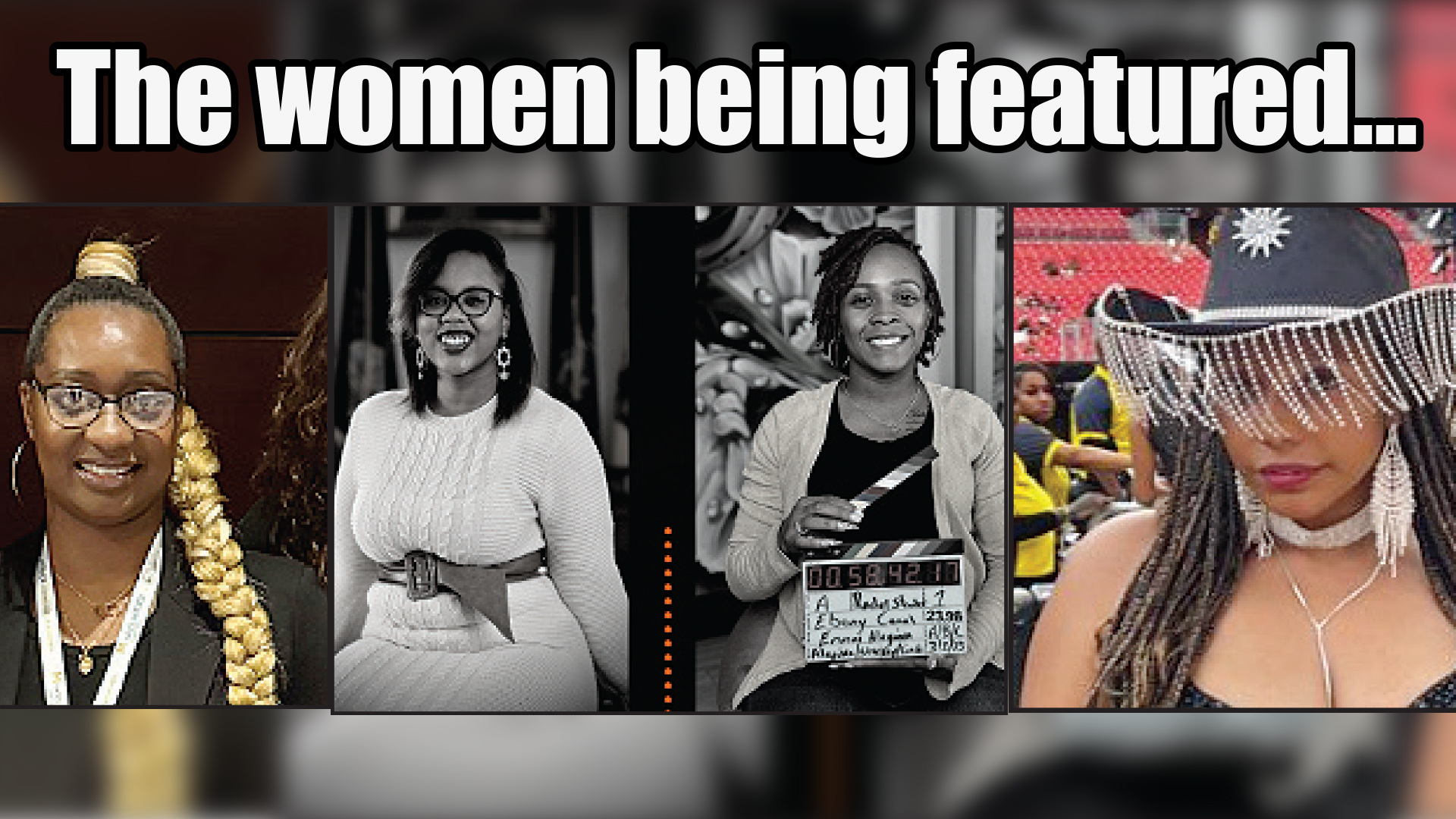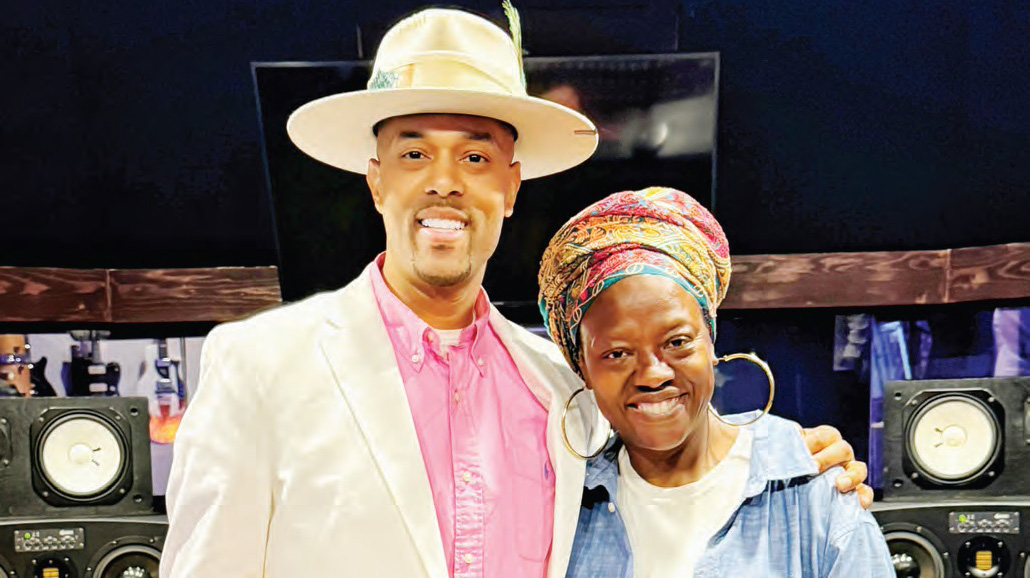EMMAI ALAQUIVA AND VIOLA DAVIS, IN LOS ANGELES. DAVIS NARRATED THE DOCUMENTARY FILM, “THE EBONY CANAL.”
‘The Ebony Canal’ to be shown, July 19, at the AWAACC
Larissa Lane wasn’t afraid to tell her story.
Now 36 years old, she’ll absolutely, positively never forget her son, Zuri. He was just two days old when he passed away on Sept. 24, 2022. One of the most traumatic events to ever happen to Lane, she said that she truly understood the meaning of the word “village” as she coped with Zuri’s death.
“People were dropping off food, people were donating money, sending me groceries, some people would come over and cook for me, I had people come over and do laundry for me and clean up for me. I’m very grateful to my village, during that time, it was such a crucial time,” Lane said on her YouTube podcast. “It makes me really emotional because you don’t really realize the people that are really there for you until you really go through things.”
There’s so much more that Lane shared to filmmaker Emmai Alaquiva as part of a new documentary called, “The Ebony Canal.” The documentary will be shown for the first time in full on Friday, July 19, at 7 p.m. at the August Wilson African American Cultural Center. Alaquiva told the New Pittsburgh Courier the tickets are going like hotcakes.

LARISSA LANE, MARIAH PEOPLES, RACHEL STRADER, ALANA YZOLA-DALY
And for good reason. In addition to Lane, Alaquiva follows the pregnancies of Mariah Peoples, Rachel Strader and Alana Yzola-Daly. All except Yzola-Daly are from Pittsburgh. The premise of the documentary is to shed light on an often overlooked issue — Black maternal health…and the fact that in the U.S., more than twice as many Black babies die before their first birthday than White babies. That statistic holds true in Pennsylvania, where the infant mortality for Black babies in 2020 was 10.9 per 1,000 live births. If you thought the 10.9 rate was bad, the rate was even higher in 2010, when the rate was 14.4.
When it comes to maternal mortality, you guessed it — Black women have it much worse, too. According to the Pa. Department of Health, in 2020, the maternal mortality rate, or the death of a woman during pregnancy or up to one year following the end of the pregnancy, regardless of the outcome of the pregnancy, was 83 per 100,000 live births. Broken down by race, White women’s maternal mortality rate in the state was 81, while Black women’s maternal mortality rate in the state was 148.
“The fact that we’re in 2024, and we have infant mortality rates where Black children are 2.4 times more likely to die before their first birthday than White babies, that underscores that it’s bigger than me, it’s bigger than you, it’s bigger than us; it’s going to take all of us to drive change,” said Alaquiva, in an exclusive interview with the Courier, July 15.
Alaquiva said the documentary came to be in 2022, when the August Wilson African American Cultural Center and the Richard King Mellon Foundation wanted to spotlight Black and brown infant mortality and how it affects people directly and indirectly. And with Alaquiva’s mission as an artist to “crystallize the human spirit around cinematic and purposeful storytelling,” the four women shared all the ups and downs of their pregnancies, the births of their children, and then up until the first year after their children’s birth. For Peoples, she brought Saint Ali Peoples into the world. For Yzola-Daly, she welcomed Leilani Daly. And Rachel Strader had a son, Alpha Ry’Heir Strader. All three babies are alive today, past their first birthday.
The documentary film will travel throughout the country, to places like New York City, Chicago, Atlanta, Washington, D.C., and Los Angeles and will be entered into the Sundance, Tribeca and Cannes film festivals.

EMMAI ALAQUIVA AND VIOLA DAVIS, AT CLEARLAKE STUDIOS IN LOS ANGELES…
Those who see the film will hear some superstar power, as Academy Award-winner (among numerous other awards) Viola Davis is the narrator for the film. Alaquiva flew to Los Angeles in June and had a recording session with Davis, whom Alaquiva said supported the documentary “1,000 percent.”
Alaquiva added: “She (Viola Davis) mentioned to me that she’s 58 (years old) and she’s focused on legacy projects, so she saw ‘The Ebony Canal’ as one of the legacy projects that she wants to be part of her legacy of changing people’s lives and helping us all to move the culture forward.”
All the proceeds from ticket sales will benefit nine organizations that are focused on Black maternal health. They are: Healthy Start Pittsburgh; Brown Mamas; Maya Organization; Elephant Song Doula; New Voices for Reproductive Justice; The Birthing Hut; Kangaroo Birthing; Mommy Beauty Cutie Foundation; and The Midwife Center.
Following the showing of the documentary, a panel discussion will take place, featuring the four women, actor and Pittsburgh native Lamman Rucker, Senior VP and Chief Diversity Officer for Allegheny Health Network Dr. Margaret Larkins-Pettigrew, Healthy Start Pittsburgh CEO Jada Shirriel, and state Rep. La’Tasha D. Mayes. The discussion will be moderated by KDKA-TV’s Mikey Hood.
Dr. Jana J. Richards, an OB/GYN for the University of Chicago Medicine Duchossis Center for Advanced Medicine, in Chicago, wrote in an opinion piece in 2023 for the hospital’s website that “racism” was the best single word to describe why Black women are more prone to pregnancy complications than women of other races.
“Race is a social construct with significant impact on the health and well-being of Black people,” Dr. Richards wrote. “At every stage of life, generations of structural racism impact Black people disproportionately in the form of social and health disparities, such as segregated housing, the digital divide, educational barriers, economic suppression and access to quality healthcare.”
Dr. Richards said that “there is nothing in a Black person’s genes or anything inherently wrong with their body that raises the risk for complications. But treatable conditions can become life or death illnesses when implicit bias and systemic racism lead to delayed or missed diagnosis, delayed or withheld treatment, and disparities in access to health education.”
Dr. Richards and other physicians always tell Black women and birthing parents to advocate for themselves during the pregnancy process. Create birth plans, have social support systems in place, contact the Healthy Starts of the world, connect with doulas, etc.
Alaquiva, who has created many documentaries, called working on ‘The Ebony Canal’ as “transformative.”
And for Lane, after losing little Zuri, she began her podcast, which is available on YouTube, under “Zuri’s Village.” She started her first episode thanking everyone for their support, and referencing the Bible verse, Romans 8:28, which Lane said it read that “God will work all things together, for the good of those who love Him.”
Lane continued: “And to me, that scripture speaks volumes in my life…every part of it, from being pregnant and having a very hard pregnancy, all the way to losing my son, that was such a traumatic space for me. And for God to take such broken places and broken moments, and bring it all together, and for me to have joy and be walking in who He called me to be…this is all God.”


